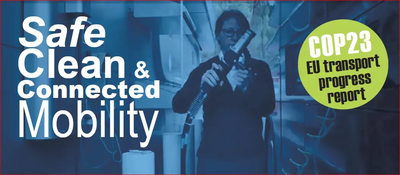EU Transport article in Summer 2018 Challenge Magazine
Safe Clean & Connected Mobility
COP23
EU transport progress report

While the UK disappears down a hole in pursuit of a white rabbit called Brexit the rest of the EU is forging ahead on the creation of a sustainable future.
In May the European Commission announced its proposals for Safe, Clean & Connected Mobility. Among these are plans for the first ever CO2 standards for heavy-duty vehicles; a strategic Action Plan for the development and manufacturing of batteries in Europe and a forward-looking strategy on connected and automated mobility.
Commissioner for Climate Action and Energy, Miguel Arias Cañete said: "All sectors must contribute to meet our climate commitments under the Paris Agreement. That's why, for the first time ever, we are proposing EU standards to increase fuel efficiency and reduce emissions from new heavy-duty vehicles. These standards represent an opportunity for European industry to consolidate its current leadership position on innovative technologies."
Safer roads
While road fatalities have more than halved since 2001, 25,300 people still lost their lives on EU roads in 2017 and another 135,000 were seriously injured.
The Commission is proposing that new models of vehicles are equipped with advanced safety features, such as advanced emergency braking and lanekeeping assist system for cars or pedestrian and cyclists' detection systems for trucks.
Clean mobility
In 2025, average CO2 emissions from new trucks will have to be 15% lower than in 2019. For 2030, an indicative reduction target of at least 30% compared to 2019 is proposed. These targets are consistent with the EU's commitments under the Paris Agreement and will allow transport companies - mostly SMEs - to make significant savings thanks to lower fuel consumption (€25,000 over five years).
To allow for further CO2 reductions, the Commission is making it easier to design more aerodynamic trucks and is improving labelling for tyres. In addition, the Commission is putting forward a comprehensive action plan for batteries that will help create a competitive and sustainable battery "ecosystem" in Europe.
Connected & Automated Mobility
Cars and other vehicles are increasingly equipped with driver assistance systems, and fully autonomous vehicles are just around the corner.
In the months ahead the European Parliament will be considering whether to establish a fully digital environment for information exchange in freight transport that will cut red tape and facilitate digital information flows for logistic operations.
The European Battery Alliance (EBA) was launched in October 2017. Its aim is to capture a battery market of up to €250 billion a year from 2025 onwards. Covering the EU demand alone requires at least 10 to 20 'gigafactories' (large-scale battery cell production facilities).
And what of the UK?
The embarrassment of riches that will be the Brexit dividend and the UK's great fortune to have, in Michael Gove, the most dynamic and competent environment minister in the whole of Europe means that the UK will have already sorted all these little challenges and more by the middle of next year, and still have money over to cull badgers and poison those pesky bees.

